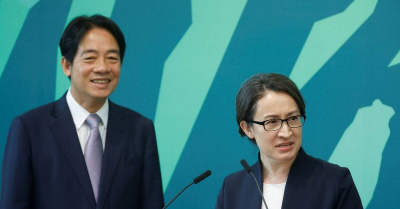Reuters-Taiwans former US envoy well-known in US vilified by China named VP candidate
November 20, 2023 5 min 856 words
这篇报道揭示了台湾前驻美大使萧碧琴作为副总统候选人的提名,引起中美两方不同反应。文章清晰展示了在美备受认可的外交官面对中国强烈反感的现象。萧碧琴在华盛顿有广泛关系,但被中国批为分裂分子。此次提名显示了台湾总统候选人赖清德强硬立场,愿意挑战中国对台湾主权的压力。文章还涉及了对于台湾两大反对党在副总统候选人选择上的挣扎,与赖清德团队的相对有序对比。整体而言,这是一场政治演练,突显了台湾在国际舞台上的复杂地位,以及两岸关系的紧张。
Lai Ching-te, the frontrunner for Taiwan's presidency, named on Monday Taipei's former envoy to the United States as his running mate in January's election, a high-profile diplomat well known in Washington but who Beijing denounces as a separatist.
Lai, vice president and the ruling Democratic Progressive Party's (DPP) presidential candidate, has led in most opinion polls ahead of the election, which is taking place as Taiwan comes under increased pressure from China to accept its sovereignty claim.
His running mate, Hsiao Bi-khim, 52, who had been Taiwan's de facto ambassador to the United States since 2020, has extensive connections in Washington, and had been widely expected to be Lai's partner on his ticket.
Hsiao said she had shared values with Lai including defending Taiwan's freedom and democracy.
"I believe we have lots of common convictions - we are both willing to take on responsibility for Taiwan," she told reporters as she stood next to Lai at campaign headquarters in Taipei.
The foreign ministry accepted her resignation as U.S. envoy earlier in the day.
Rupert Hammond-Chambers, president of the U.S.-Taiwan Business Council who has known Hsiao since the 1990s, said she was a "formidable politician", and would add much needed diplomatic and security heft to Lai's ticket.
"Bi-khim's relationships in D.C. will be invaluable to a President Lai, if he is elected, she's going to bring all of those relationships into his government and he doesn't have those," he told Reuters.
The United States, as with most countries, has no formal ties with Taiwan, but is the island's most important international supporter and arms supplier.
Like Lai, Hsiao is despised by China, which has twice placed sanctions on her, most recently in April, saying she was an "independence diehard".
China's foreign ministry declined to answer a question about Hsiao, saying it was not a diplomatic issue.
China's Taiwan Affairs Office on Wednesday referred to Lai and Hsiao as an "independence double act", adding that Taiwan's people were "very clear" about what their partnership meant for the "situation in the Taiwan Strait". It did not elaborate.
Lai, asked about these comments, dismissed what he said were "thoughtless remarks".
"This is sufficient to prove that China is intervening in this election," he told reporters. "We only put importance on our people's issues."
China carried out military drills around Taiwan in August, after Lai returned from a brief visit to the United States, in what the Chinese military said was a "serious warning against Taiwan independence separatist forces colluding with external forces to provoke".
The DPP champions Taiwan's separate identity from China. The DPP-led government says only Taiwan's people can decide their future, and it has repeatedly offered talks with Beijing but been rebuffed.
The DPP's smooth handling of its vice presidential nominee stands in contrast with efforts by Taiwan's two main opposition parties to agree on a joint ticket. Their negotiations have stalled.
The largest opposition party, the Kuomintang (KMT), which traditionally favours close ties with Beijing, is locked in a dispute with the smaller Taiwan People's Party about which of their candidates should run as president and which as vice president after initially agreeing to work together.
The deadline to register presidential candidates with the election commission is Friday.
Lai, writing on Facebook earlier on Monday, pointed to the "turmoil" in the opposition camp.
"In contrast, the team I lead is definitely a fully prepared and tested one," he said.
Hsiao was born in Japan to a Taiwanese father and American mother and initially worked in the office of then-president Chen Shui-bian, also from the DPP, and then as a DPP lawmaker.
Unusually in Taiwan, she uses an English spelling of her name based on its Taiwanese Hokkien pronunciation to underscore her identity as being Taiwanese and not Chinese.

